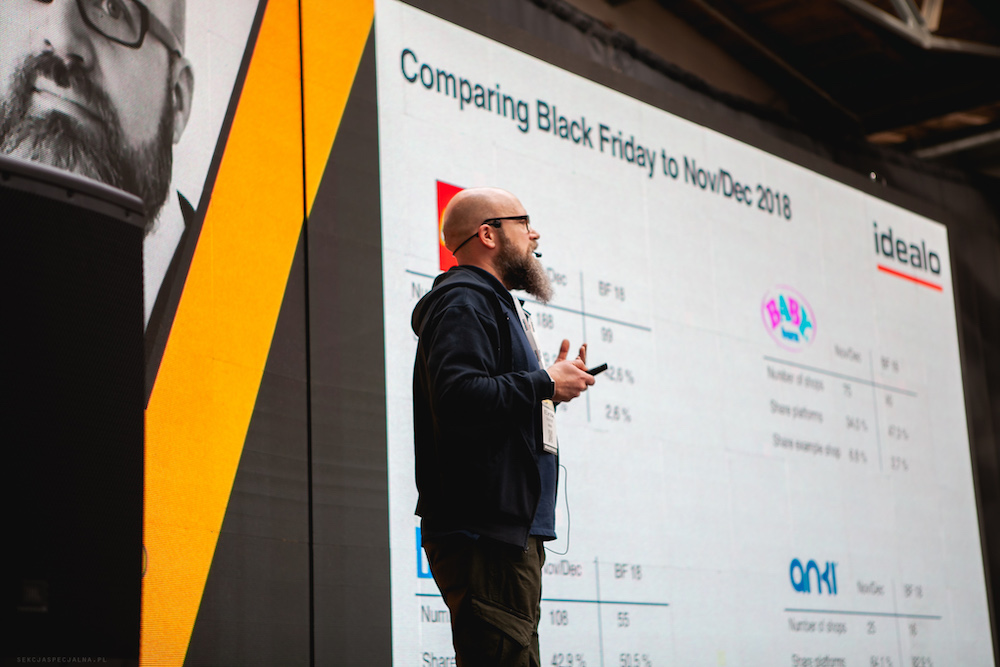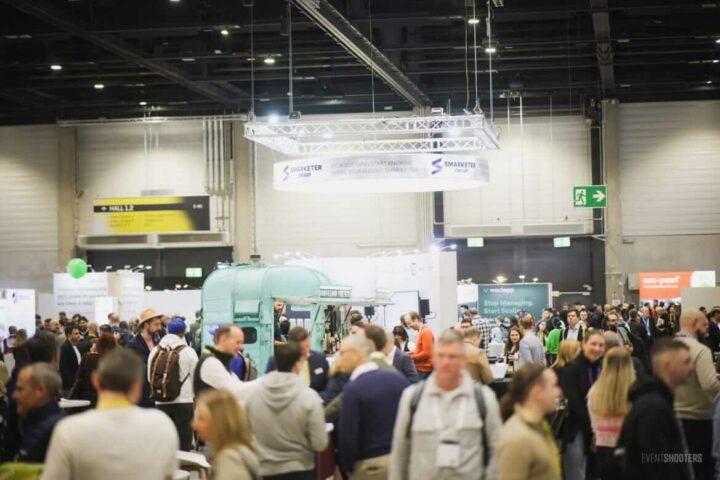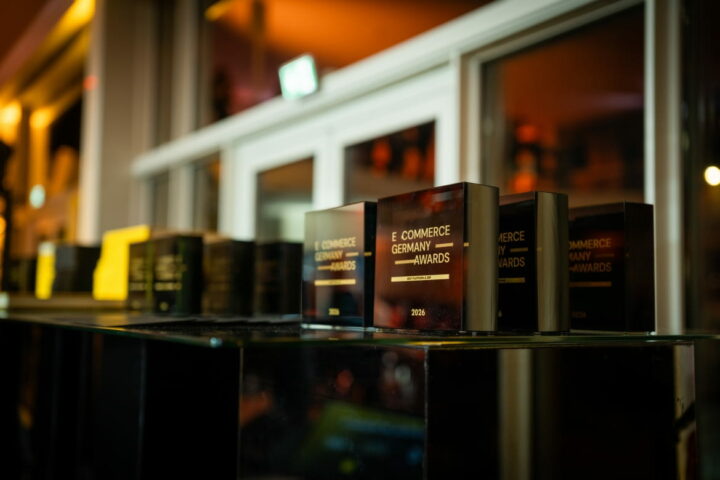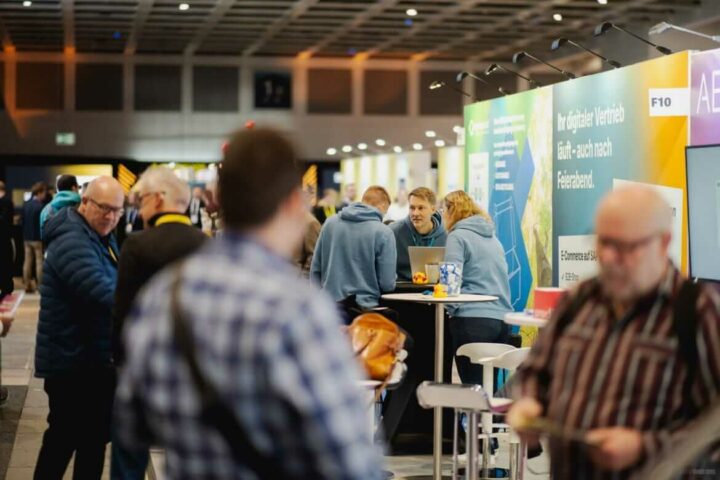EBE 2019 – E-Commerce Trends 2019 – fear and desire of German online shoppers
Written by
Kinga EdwardsPublished on

E-commerce Berlin Expo 2019 was truly packed with amazing insights presented by knowledgeable and experiences speakers from all over the world. One of them was Erik Meierhoff, Head of B2B business in Idealo. Idealo is a price comparison website which allows users to compare prices on a range of products from hundreds of shops.
During EBE 2019, Erik decided to share a few data-driven conclusions, insights and statistics that apply to German market. His presentation was spot-on, and below you’ll find some of the transcript plus additional comments! If you prefer to watch his presentation (nearly half an hour), you’ll find all links under the transcript. Enjoy!
______________
Company: Idealo
Speaker: Erik Meierhoff, Head of B2B business
Topic: E-commerce Trends 2019 – fears & desires of German online-shoppers
______________
Before we start, let’s take a look at Idealo.
Needless to say that Idealo is an e-commerce giant, with 16m+ visitors every month and almost 7m app downloads. Also, needless to say that thanks to the aforementioned numbers, they are able to deliver impressive and precise data.
Erik:
We have a lot of data in Idealo, so I can share insights. We have recently 337 million products, we have 3 billion data points each day to analyze, it makes it one of the biggest tech data stacks in e-commerce. It gives a perfect overview of the market in Germany so I can share reliable results.
Based on that knowledge, Idealo analyzed both actual trends and upcoming trends on the German market. The first part of the presentation was the review of Black Friday and Christmas season in 2018, in the Idealo point of view.
First of all, Erik emphasised that the peak of e-commerce shopping spree is Black Friday, making it a perfect kick-off to the Christmas season. Later on, he showed the chart (below) with the most popular categories chosen by German buyers. Electronics, House & Garden, Gaming, Fashion & Accessories – those four categories gained the most popularity in November and December 2018.
According to Idealo statistics, they noticed 9% growth and visits on their website comparing to they year 2017 (from 48.3M to 53.6M). Erik said that “Traffic on Idealo was nearly doubled for Black Friday on 2018”. But the question is – how do German shoppers prepare for Black Friday? 67% of them plan their purchase in advance, while 55% don’t even believe in Black Friday discounts. What are they scared about, what stops them, and what should merchants take into account when planning their Black Friday actions? Erik mentioned it during his presentation as well, but we’ll talk about it a bit later.
As Erik mentioned: “Black Friday is an undeniable peak in Germany. People do buy very high high value goods then. 35% of clients shop for Christmas actually on a Black Friday day since then there are good deals available. The whole cyber week is a popular period for shopping, but Black Friday is definitely “the one”.
Erik also wanted to point our attention to customers’ behaviour during that period: “people are very critical about Black Friday – they compare and check prices, so if you are a merchant who wants to participate in Black Friday, you better be well prepared since your offer will be definitely double-checked and compared.”
Erik also revealed the most bought product during Black Friday in 2018.
The most bought product was Apple earpods. What is interesting, though, is that people were so crazy about Black Friday that they bought those earpods even though they were not the cheapest that day – before they were even cheaper.
Erik also revealed what the huge winner in the category of toys is – Lego.
Black Friday is taken as a period of price development of gifts before Christmas, clients become less price-sensitive after Black Friday and products get more expensive before Christmas. People are waiting the whole year for Black Friday. It’s basically a must for merchants.
What are the fears and desires of German consumers?
Idealo did the survey and ask consumers about trends. In the 2019 edition they found out that the German customer is ambivalent. What does it mean?
Erik explained it briefly:
If you ask German customers whether they want to share their data, the vast majority of Germans are scared of it. They don’t want to share too much data or have their data processes for customized offers. They are skeptical towards personalized offers, they simply don’t believe in well-adjusted, personalized offers.
however,
if German shoppers get some great deals for sharing their data in return, they are happy to do so (60% of them would reveal their personal data if they got offered amazing benefits).
Erik also revealed how doubtful German customers are in terms of dynamic pricing.
Erik highlighted that only 14% consumers think that merchants use dynamic pricing for best deals for clients. They have some ideas of the dynamic pricing. Their belief is that the pricing is higher in the evening than in the morning, and in the weekend. This belief is not reflected in our analysis and results, though.
Also, Erik revealed a few slides with analysis of prices in a few categories and they can also prove German shoppers wrong. Idealo checked prices for TVs, phones and perfumes – they were the most expensive respectively on Saturday, Friday and Monday.
Idealo took a deep look at online shopping and offline shopping habits of German customers, showing a mix of both worlds.
Erik claimed that data and innovations do not quite work yet in Germany – German shoppers do not really have voice commerce devices and they do not pick up innovations overnight, but they are open for chatbots, so it can be a clear sign for merchants to start investing in some of them.
______________
If we only whet your appetite and you would like to see a few slides yourself (plus even more data!, you can find the whole presentation here:
Also, we strongly recommend you to watch his presentation on our official YouTube channel:
Enjoy! And see you on the 2020 edition of the E-commerce Berlin Expo.


